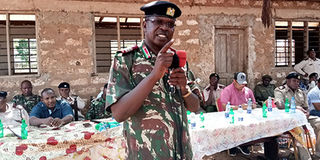
Lamu County Commissioner Irungu Macharia.
| Lamu County Commissioner Irungu Macharia. File photoLamu
Premium
Calm returns to Lamu villages where chiefs, police were once targeted by gangs
A year ago, walking alone in the Lamu East villages of Mbwajumwali, Myabogi and Tchundwa was a risky affair, more so for local administrators and even police officers. It didn’t matter whether it was during the day or at night.
The villages were under siege from gangs targeting chiefs, Nyumba Kumi officials and police officers. Many of them were being killed by panga-wielding assailants.
Fear prompted villagers to frown upon taking up any role related to those three positions.
On the morning of June 10, 2016, Mohamed Shee, 50, a senior chief in Mbwajumwali Location was heading to work at around 9am when he was waylaid and hacked to death by an unknown gang.
The killing left residents tense. The remote village, hitherto a haven of peace for the residents, who are mostly fishermen, mangrove loggers and small-scale farmers.
Unexplained murders
Shee’s murder was the precursor to a period of darkness as more chiefs, Nyumba Kumi officials and police would meet their deaths in such gruesome fashion, puzzling villagers and administrators alike.
In April 2019, Amina Bakari, 30, a volunteer peer educator with the Kenya Red Cross Society and a nyumba kumi official, was hacked to death as she closed her shop in Mbwajumwali village at 11pm.
Six months later, the same village was back in the news again. On December 11, 2019, a chief and his assistant were killed in cold blood inside their office.
In a daytime attack, Senior Chief Mohamed Famau Haji, 45, and Myabogi assistant chief Athman Malik Shee, 43, were hacked to death by two unknown assailants who stormed their office at around midday.
Police officers operating in the villages also faced the same wrath, with at least two killed by machete-wielding gangs.
Constable Hesbon Okemwa Anunda was murdered on October 5, 2019. Anunda, whose badly mutilated body was discovered in a mangrove forest near Kizingitini, was attached to the Tchundwa Police Post.
On June 8, 2020, police constable Rodgers Odhiambo, also attached to the Tchundwa Police Post, was waylaid and killed as he walked out of a shop at Tchundwa village at around 8.30pm.
With these deaths, the local security administration swung into action. It is now almost a year since the last such murder was reported.
“Previously, we were afraid of walking around at night as the murderers were unpredictable. But 10 months have passed without any killing incident. We hope it remains that way,” said Mr Bakari Athman, a resident of Mbwajumwali.
Nation.Africa sought to understand how the government managed to restore calm in the notorious Lamu East villages.

Coast Regional Coordinator John Elungata speaks during a security meeting in Mbwajumwali village, Lamu East on December 17, 2019. He gave a seven-day ultimatum to locals to provide information that will lead to the arrest of people who killed a chief and his assistant on December 11, 2019. PHOTO | KALUME KAZUNGU | NATION MEDIA GROUP
First, frequent meetings organised by top security officials, including Coast Regional Commissioner John Elung’ata in the affected villages helped to shape the villagers’ perception of the government.
A security officer working in Lamu East said citizens in the area are now friends of the police and chiefs, which has enhanced their work.
“We have a good working relationship with the locals here. It’s easy for us to get information and act promptly, unlike before,” said the officer.
Secondly, the establishment of police posts in the affected villages has also helped in improving general security.
After the murder of the two chiefs at Mbwajumwali, Mr Elung’ata directed that a police post be immediately established in the area.
Ms Khadija Hamisi says suspects now find it hard to carry out any attacks since police patrols have been intensified, especially after the police post was established within their village.
Kazi Mtaani
The government has also been engaging and absorbing idle youth in jobs through the Kazi Mtaani initiative.
Lamu County Commissioner Irungu Macharia says such initiatives have reduced the number of youths engaging in drugs and preventing them from crime.
Mr Macharia said the government is not giving up and will continue to employ every possible tactic to ensure the villages are governable again.
He called on residents to respect the law and cooperate with the various security agencies working in the area to bring to an end the cases of crime and drugs in the region.
“We had the challenge of criminal gangs who were targeting our chiefs and the police. We are happy that today, such incidents are no more. We have been conducting frequent operations in the area. Many suspects were nabbed and prosecuted,” said Mr Macharia.




